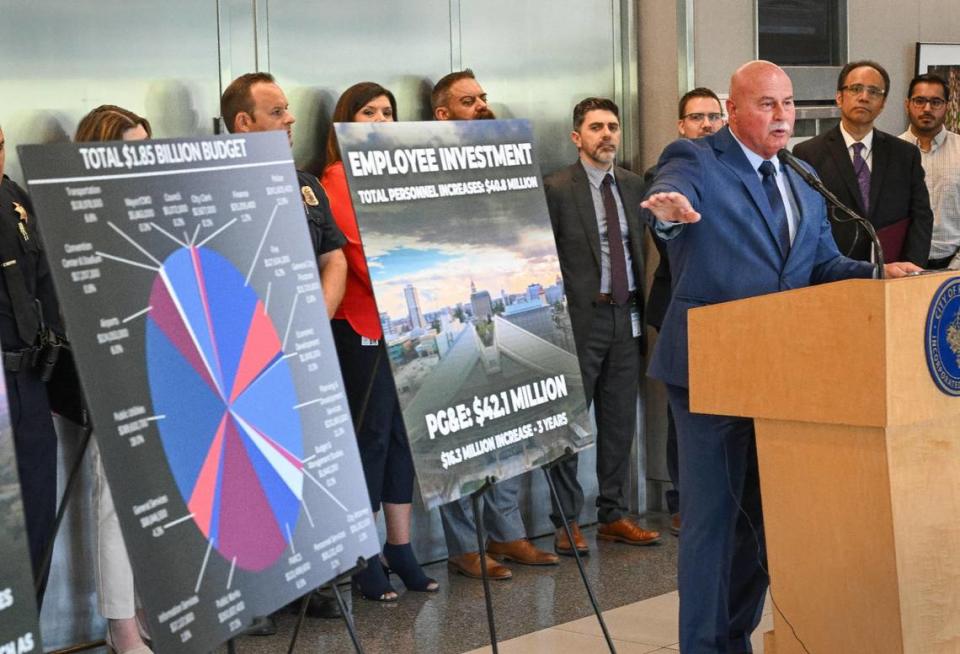Fresno city leaders wrongly keep public in the dark over final budget decisions | Opinion
- Oops!Something went wrong.Please try again later.
Fresnans are less informed about the last-minute deal-making involved in getting the city budget approved than residents of any large city in California.
By less informed, I mean kept in the dark while the proverbial sausage gets made.
Whether negotiations between Mayor Jerry Dyer’s administration and a city council subcommittee to whittle down dozens of costly budget amendments are held contrary to state public meeting laws is the subject of an illuminating report by the local news nonprofit Fresnoland. It is well worth your eyeballs.
Omar Shaikh Rashad’s story includes multiple legal experts who say these closed-door meetings, which are not open to the public and have no posted agendas, minutes or attendance, are in fact a Brown Act violation or “problem.”
It also quotes Fresno City Attorney Andrew Janz, who contends the budget subcommittee is not subject to the Brown Act because it qualifies under the law’s “narrow exception” for temporary, or ad hoc, committees.
Opinion
That’s a debate for actual lawyers that could very well play out in an actual courtroom. Stay tuned.
But to me, it’s a point that resides beside the actual point. The one that needs to be made.
During its reporting, Fresnoland reviewed how other California cities reconcile their proposed budgets from the one that actually gets adopted. Turns out every other top 10 population city that maintains a budget committee — Los Angeles, San Diego, San Francisco, Sacramento, Long Beach, Oakland, Anaheim and Bakersfield — keeps those meetings open to the public.
Every one except Fresno.
(San Jose, the only city not on the above list, does not have a budget committee and hashes out its annual spending plan publicly before the entire city council.)
Even though Fresno officials may argue that the budget committees in those cities are of the permanent, standing variety and therefore subject to the Brown Act while Fresno’s are not, that again is beside the point.
The point is transparency —specifically, the lack of it.
There is no counterpoint to be made, or legal vagaries to be argued. During late stages of the budget process, the curtain between the public and local government is more opaque in Fresno than in any large city in California.
Which is not something Dyer or any city official should be proud of, let alone try to defend.

Negotiations hidden from public view
Here’s a rough outline of the city’s process: Following the release of the mayor’s proposed budget in May, the Fresno City Council holds two weeks of June budget hearings that are open to the public and include public comment. Each city department director gives a presentation, after which individual council members get to ask questions as well as propose changes and amendments in the form of “budget motions.”
This year alone, the seven council members put forth a combined 120 “budget motions,” of which 75 (with a price tag of nearly $30 million) wound up being either entirely or partially funded by the city’s $1.87 billion fiscal year 2024 budget.
Those negotiations, held between the Dyer administration and council budget subcommittee members Tyler Maxwell, Annalisa Perea and Mike Karbassi, took place over the course of numerous meetings and out of public view.
“A lot of sausage was being made in the back room,” Dyer told reporters during a June 22 press conference.
Because of this veil, the public doesn’t get to know how those budget decisions are reached. Why certain motions are adopted while others get orphaned, and what horse trading goes on during that process.
By far, the largest city council proposal that made it into the budget was an additional $6.7 million for street paving and repair. How did city leaders decide which streets to include and which to leave off?
The public isn’t allowed to know any of that because those decisions are made behind closed doors. And when elected officials meet and make decisions about taxpayer dollars in secret, it’s either because they have something to hide or don’t want to face scrutiny.
Well, tough. Dyer and the city council should take immediate steps to make their budget wranglings more transparent and stop trying to hide behind legal interpretations of the Brown Act.
It’s a bad look. Regardless of size, Fresno will never truly be a big city as long as its leaders cling to small-town secrecy.

